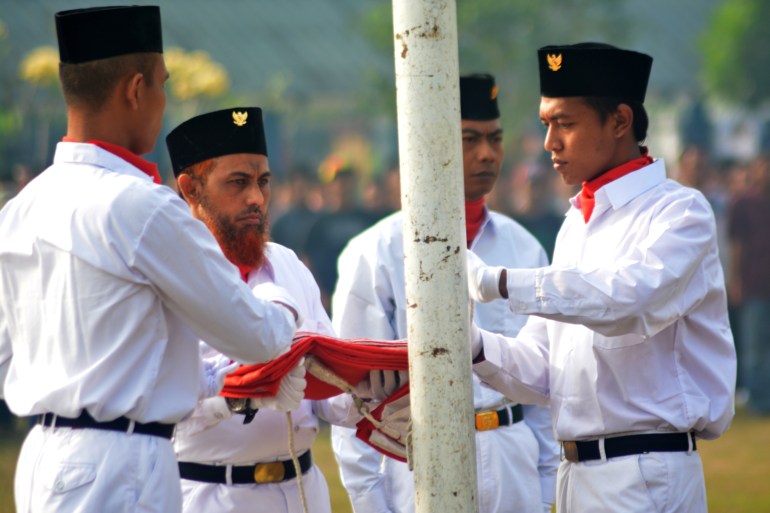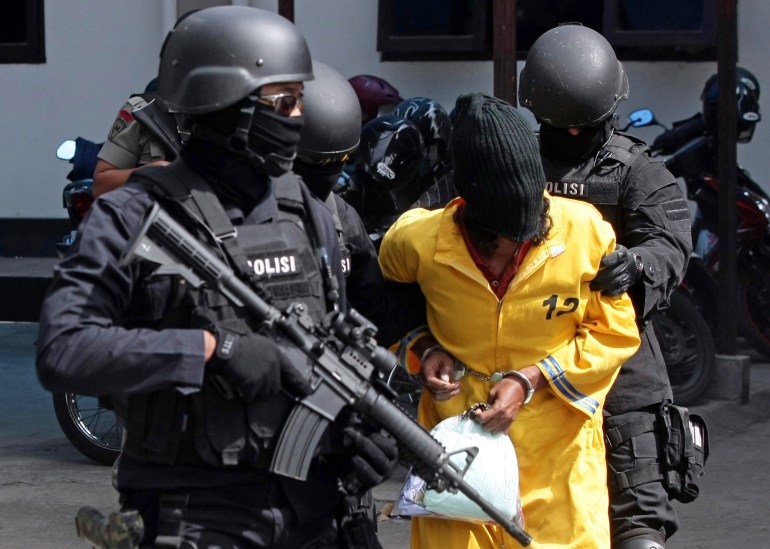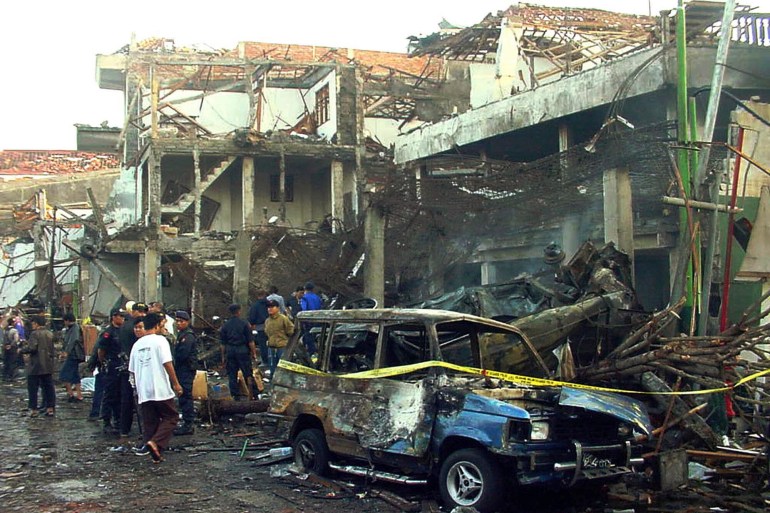Medan, Indonesia — As Indonesia marks 20 years because the Bali bombings, a few of these convicted in reference to the assaults, which killed greater than 200 individuals, say they’ve renounced their hardline leanings, drawing renewed consideration to the nation’s deradicalisation efforts.
Umar Patek, who was jailed for 20 years in 2012 for mixing a number of the chemical compounds used within the October 12 assaults, which additionally injured greater than 200 individuals, not too long ago made headlines after it was revealed he may develop into eligible for parole, partially as a result of he accomplished a sequence of deradicalisation programmes whereas behind bars.
On the identical day, Abu Bakar Bashir, the non secular godfather of Jemaah Islamiyah (JI), the hardline group behind the 2002 bombings, attended a flag-raising ceremony as a part of Indonesia’s Independence Day festivities on August 17.
Bashir was launched from jail in 2021 having served 11 years of a 15 yr sentence for funding hardline coaching camps. He was launched after being given commonplace remission time for good behaviour and though he had been thought-about for parole earlier than his eventual launch, he didn’t qualify as a result of he refused to fulfil the factors.
To be launched on parole, convicts should resign “terrorism” and pledge allegiance to the Indonesian state — two commitments seen as a litmus check of whether or not a convict has been deradicalised.
A part of JI’s ethos centred on a want to rework Indonesia, the world’s most populous Muslim nation, into an Islamic caliphate, which meant JI typically focused the police and the military — seen as symbols of the state — of their assaults.

Whereas the Indonesian authorities have used figures resembling Patek and Bashir as examples of how people will be successfully deradicalised, some stay sceptical.
When experiences emerged that Patek may get parole — after serving 11 years of a 20-year sentence — there was uproar in Australia, the house of 88 of these killed within the Bali bombings. Prime Minister Anthony Albanese mentioned Australia deliberate to protest in opposition to any potential launch. Australian survivors of the bombing additionally expressed disbelief that Patek may have been efficiently deradicalised in such a comparatively quick time period.
However specialists say deradicalisation is difficult and completely different for everybody.
“The problem is that there isn’t any correct systematic evaluate of the research which were achieved on Indonesian deradicalisation and most of the people take a look at a small subset of deradicalisation efforts in Indonesia,” Judith Jacob, the pinnacle of Asia for the danger and intelligence firm Torchlight, instructed Al Jazeera.
“Additionally the time period deradicalisation typically will get conflated with disengagement and is so nebulous. Does it imply that a person renounces all beliefs in a bunch’s ideology or only a dedication to violence? Do they utterly depart these networks and what does reintegration into mainstream society imply in that context?” she added.
Evolving strategy
Indonesia launched into deradicalisation programmes within the Nineteen Nineties in response to the emergence of teams resembling JI, which was based in 1993 by Abu Bakar Bashir and Abdullah Sungkar.
Jacob says that within the years since, the Indonesian authorities and Densus 88, the nation’s elite counter terrorism unit, have develop into higher at making the programmes more practical.
“These programmes had been massively underfunded and principally achieved off the cuff, with no understanding of the method or objectives or desired outcomes,” she mentioned.
In 2010, nonetheless, Densus 88 was included into BNPT (Indonesia’s Nationwide Counter Terrorism Company) boosting staffing and sources throughout the board.

Nonetheless Jacob, who prefers the time period disengagement to deradicalisation to explain the method of attempting to get a person to maneuver away from excessive views, says such programmes usually are not “an enormous precedence” for Indonesia.
Since about 2016, the federal government has outsourced a lot of the work to civil society teams or distinguished ex-fighters.
One former JI member, Arif Budi Setyawan, who was jailed for 3 years, instructed Al Jazeera the “teaching” programmes he adopted in jail — supplied by the jail, BNPT and Densus 88 — helped him change his methods.
He spent two years and two months in jail after remission and was launched in 2017.
“Deradicalisation from the jail makes use of a private strategy that works with the inmates day by day, little by little,” he mentioned. “This technique, though sluggish, is efficient sufficient for some convicts to vary their mind-set, from hating the state to being keen to just accept and make peace with the state.”
The programme from BNPT was extra structured, he mentioned, involving specialists and lecturers from the fields of psychology, sociology and faith.
Sadly, Setyawan mentioned, BNPT solely hosted about two or three actions per yr, whereas Densus 88 carried out extra intensive actions via dialogue and dialogue with convicts each month.
“These three deradicalisation improvement fashions are comparatively efficient for convicts who’re beginning to open their minds whereas incarcerated. Nevertheless, not all convicts are open-minded, as a result of when they’re imprisoned, they hate the state much more and don’t need to be part of the teaching programmes,” he mentioned.
Assessing success
Threat analyst Jacob cautions that it’s also tough to evaluate the relative success or failure of a programme utilizing knowledge alone.
“For those who’re anticipating former group members to completely resign beliefs and reintegrate into “average” society, that’s a tall order and never practical. What you need to be taking a look at for achievement is reoffending charges or individuals committing acts of violence having been via nationwide authorities programmes, civil society ones or native authorities programs,” she mentioned.

In accordance with knowledge from BNPT, 50 of the 850 individuals who had been jailed for terrorism-related offences and had been launched after apparently renouncing their hardline views, reoffended between 2002 and 2019, giving a recidivism price of simply lower than 6 %.
Jacob says the factors used to measure such knowledge is obscure, not solely about the kind of motion that constitutes reoffending, but in addition the numbers of individuals topic to a programme and the type of parts included.
In odd felony circumstances in 2019, the Ministry of Legislation and Human Rights mentioned the recidivism price was 21 % for property crimes, 13 % for drug offences and 4 % for petty crime.
Rizka Nurul, a researcher at Ruang Obrol, a web-based platform that focuses on deradicalisation in Indonesia via journalism and group constructing, instructed Al Jazeera there’s normally a marked distinction between authorities deradicalisation programmes and the schemes run by civil society organisations (CSOs).
“CSOs desire to name them reintegration and disengagement programmes. Whereas the federal government nonetheless makes use of the time period deradicalisation. The federal government’s deradicalisation programme is now very numerous and completely different from the earlier one which was extra ideological or monetary in nature,” she mentioned, including the federal government noticed higher success with high-profile JI members when it used a extra versatile strategy slightly than partaking in ideological debates with former radicalised people.
“These days they have an inclination to give attention to group formation and psychological help. For instance, the method of ‘deradicalisation’ of ideological figures resembling Abu Bakar Bashir, is usually achieved by humanist public dialogue and is not targeted on non secular debates.”
She provides, nonetheless, that whereas smaller, extra grassroots programmes might present a extra tailor-made strategy to deradicalisation, these sorts of programmes even have points that may hinder slightly than assist a person’s progress.
“CSOs take a extra numerous strategy as a result of they’re extra versatile, however their weak spot is that they is probably not sustainable for quite a lot of causes together with restricted funds,” she mentioned.
“Unsustainable programmes have the potential to spark recidivism as a result of the person might have extra time however the programme can not accommodate them.”